Welcome to Summit Church’s Virtual Stations of the Cross
This page is here to meditate on and walk through the stations of the cross on Good Friday.
Opening Remarks and Illustrations by Scott Erickson, Reflections by Morgan Holick
The stations of the cross began as a practice that pilgrims would have when they were retracing Jesus’s final steps in Jerusalem up to the hill where he was crucified. Wanting to share that practice and experience with people who couldn’t make the trip to Jerusalem, they created the stations of meditation that became in itself a tradition. You can find this tradition on the inside of many churches today.
This journey to the cross is not only a meditation of Jesus accomplishing what he came to do – the redemption of humanity through his own willful sacrifice – but it’s also a contemplation of Jesus silently participating in some of the worst aspects of being human. We see him being tempted. Being betrayed by a friend. Being convicted in an unjust system. Physical pain. Mockery. Public humiliation. Broken family relationships. And one of our greatest fears… Having to die. These are all aspects of human life that he was not insulated from. In fact on the cross he quotes King David saying “My God, my God why have you forsaken me?”… as if to say “Why is it like this?” He was one who is not separate from our own pain.
I don’t think our deepest question is “is there a God?” I think our deepest question is “Is there a God that’s with us in all this?”
These stations are a cross-section of elements, ideas, and objects from Jesus‘s journey of being with us. As you work through the stations, may you see that we are not troubled guests in this world… That we are not forgotten… And that the good news of the season was expressed best by Jesus when he said “In this world you will experience many trials. But take heart… I have overcome the world.”
How to Participate:
We would like to suggest cultivating a quiet space to meditate on this journey while reading through the page. We suggest lowering the lights in your home, finding a quiet spot, putting on some instrumental, meditative music, and perhaps burning our favorite candle, incense, or diffuse some essential oils.

Jesus is Tempted
“My soul is overwhelmed with sorrow to the point of death. Stay here and keep watch with me.” Matthew 26:38
Read: Matthew 26:36-46
36 Then Jesus went with them to the olive grove called Gethsemane, and he said, “Sit here while I go over there to pray.” 37 He took Peter and Zebedee’s two sons, James and John, and he became anguished and distressed. 38 He told them, “My soul is crushed with grief to the point of death. Stay here and keep watch with me.”
39 He went on a little farther and bowed with his face to the ground, praying, “My Father! If it is possible, let this cup of suffering be taken away from me. Yet I want your will to be done, not mine.”
40 Then he returned to the disciples and found them asleep. He said to Peter, “Couldn’t you watch with me even one hour? 41 Keep watch and pray, so that you will not give in to temptation. For the spirit is willing, but the body is weak!”
42 Then Jesus left them a second time and prayed, “My Father! If this cup cannot be taken away[a] unless I drink it, your will be done.” 43 When he returned to them again, he found them sleeping, for they couldn’t keep their eyes open.
44 So he went to pray a third time, saying the same things again. 45 Then he came to the disciples and said, “Go ahead and sleep. Have your rest. But look—the time has come. The Son of Man is betrayed into the hands of sinners. 46 Up, let’s be going. Look, my betrayer is here!”
Reflect: In this story, the disciples have just learned that they will desert Jesus in his time of need. While the disciples do not physically desert him (that will come later) during his prayer vigil, they still desert him by falling asleep. Under extreme duress and agony, Jesus was left without the comforting touch of a friend. Jesus chastises them for not being good companions. His urge to “keep awake” was an attempt at communicating many things: first, it was an urge to stay alert for the coming change and second, it was a call to be engaged in what God was doing in the world. It was a call to remain present and hopeful in what was to come. They did not stay alert or present. They failed in their calling to be faithful witnesses and they failed at being good friends. In what ways do you find yourself falling asleep like the disciples? How can you be a better witness and friend?

Jesus is Betrayed
“Friend, do what you came here to do.” Matthew 26:50
Read: Matthew 26:47-56
47 And even as Jesus said this, Judas, one of the twelve disciples, arrived with a crowd of men armed with swords and clubs. They had been sent by the leading priests and elders of the people. 48 The traitor, Judas, had given them a prearranged signal: “You will know which one to arrest when I greet him with a kiss.” 49 So Judas came straight to Jesus. “Greetings, Rabbi!” he exclaimed and gave him the kiss.
50 Jesus said, “My friend, go ahead and do what you have come for.”
Then the others grabbed Jesus and arrested him. 51 But one of the men with Jesus pulled out his sword and struck the high priest’s slave, slashing off his ear.
52 “Put away your sword,” Jesus told him. “Those who use the sword will die by the sword. 53 Don’t you realize that I could ask my Father for thousands[a] of angels to protect us, and he would send them instantly? 54 But if I did, how would the Scriptures be fulfilled that describe what must happen now?”
55 Then Jesus said to the crowd, “Am I some dangerous revolutionary, that you come with swords and clubs to arrest me? Why didn’t you arrest me in the Temple? I was there teaching every day. 56 But this is all happening to fulfill the words of the prophets as recorded in the Scriptures.” At that point, all the disciples deserted him and fled.
Reflect: In this story, Jesus has moved from his plea “remove this cup from me” to “thy will be done.” He surrenders his fear and acknowledges the difficult road that lies before him. He expects the betrayal of Judas. Jesus could have allowed the violence that took place to occur as an act of holy defiance, but he doesn’t. He rebukes the violence and accepts his demise without hesitation and more importantly- with hope. With his own crucifixion with sight, Jesus affirms the redemption of God at work in the world. His story was just a piece of something much larger that was unfolding. Judas regrets his betrayal later on and tries to return the money he made off of it, but the money is not accepted because it is “blood money.” Judas realized the money he made was no longer valuable. He traded away the most valuable thing he knew for 30 pieces of silver- about 600$ in today’s world. What have you betrayed for money? Relationships? God’s call on your life? Your own integrity?
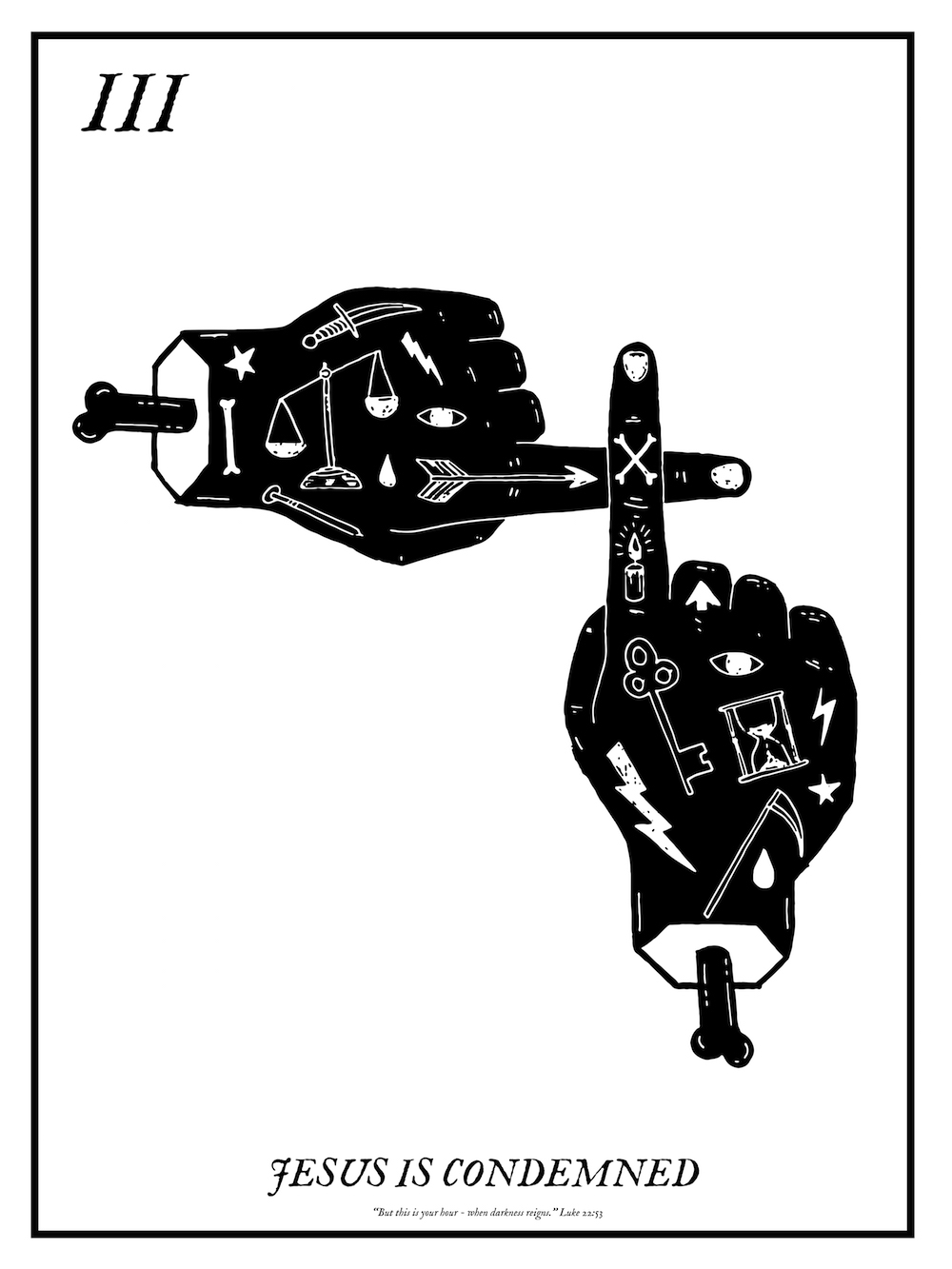
Jesus is Condemned
“But this is your hour when darkness reigns.” Luke 22:53
Read: Luke 22:47-53
47 But even as Jesus said this, a crowd approached, led by Judas, one of the twelve disciples. Judas walked over to Jesus to greet him with a kiss. 48 But Jesus said, “Judas, would you betray the Son of Man with a kiss?”
49 When the other disciples saw what was about to happen, they exclaimed, “Lord, should we fight? We brought the swords!” 50 And one of them struck at the high priest’s slave, slashing off his right ear.
51 But Jesus said, “No more of this.” And he touched the man’s ear and healed him.
52 Then Jesus spoke to the leading priests, the captains of the Temple guard, and the elders who had come for him. “Am I some dangerous revolutionary,” he asked, “that you come with swords and clubs to arrest me? 53 Why didn’t you arrest me in the Temple? I was there every day. But this is your moment, the time when the power of darkness reigns.”
Reflect: At the end of this story, Jesus acknowledges the presence of evil and darkness and allows it to have its way. This is a demonstration of Jesus’ power. He is still in control. This is an intentional choice he made to allow darkness to “win.” In a sense, this is a good example of losing the battle yet winning the war. Jesus had a bigger picture in mind and knew that the holy light of redemption would shine brightest in the midst of the darkness. The condemnation of Jesus is slimy and schemey and unjust. Jesus doesn’t march around declaring how unfair the world is though. He doesn’t even use his connections (i.e. the most powerful connection in the universe) to get him out of his sentence. He accepts it because of his undying hope in redemption. We have all faced difficult battles in life. Many of us have probably lost a few of those battles. On ‘losing’ days, do you let your holy hope in redemption have the last word? What can you be doing to remind yourself of the bigger picture?
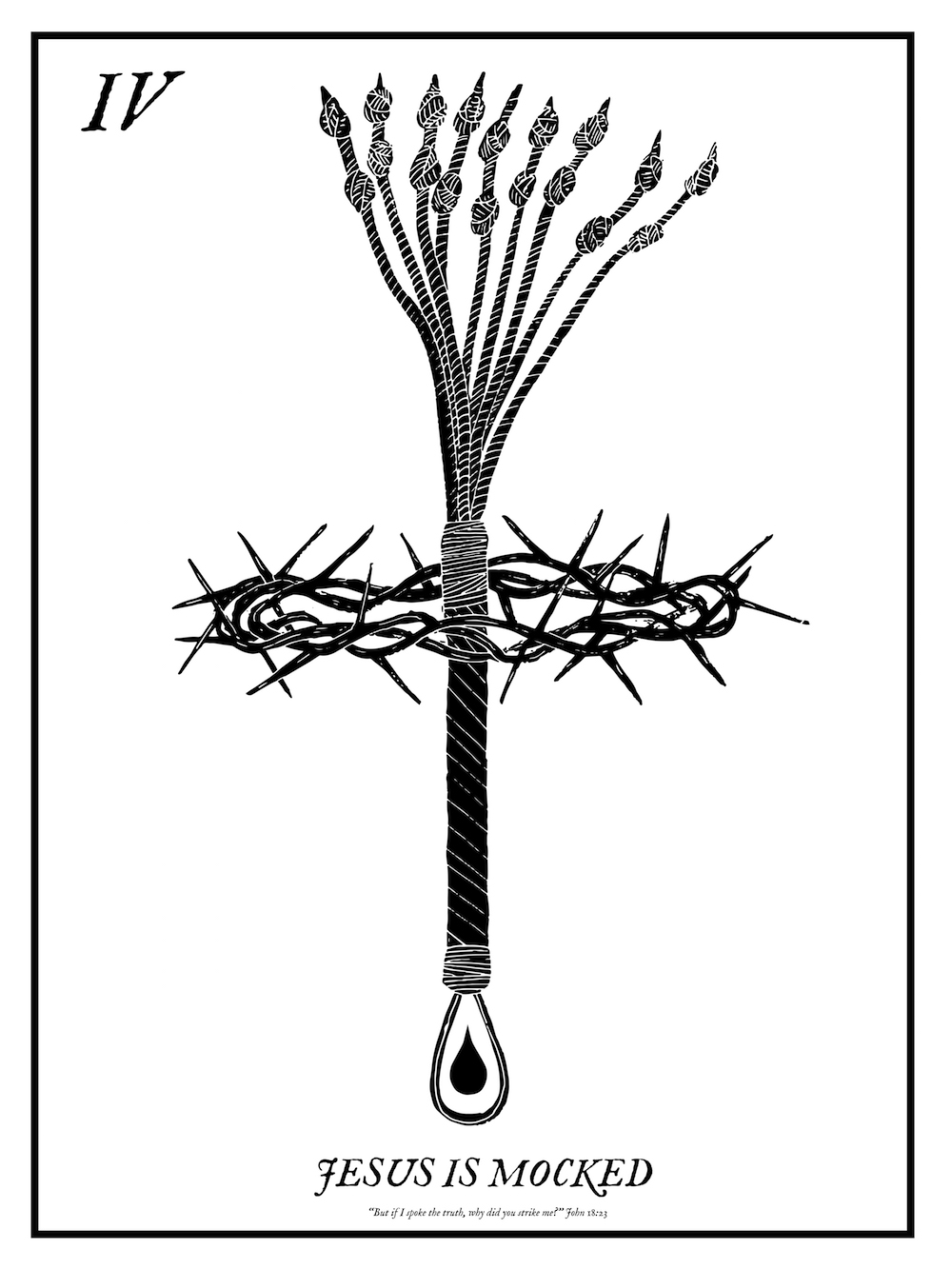
Jesus is Mocked
“But if I spoke the truth why did you strike me?” John 18:23
Read: John 18:19-23
19 Inside, the high priest began asking Jesus about his followers and what he had been teaching them. 20 Jesus replied, “Everyone knows what I teach. I have preached regularly in the synagogues and the Temple, where the people[a] gather. I have not spoken in secret. 21 Why are you asking me this question? Ask those who heard me. They know what I said.”
22 Then one of the Temple guards standing nearby slapped Jesus across the face. “Is that the way to answer the high priest?” he demanded.
23 Jesus replied, “If I said anything wrong, you must prove it. But if I’m speaking the truth, why are you beating me?”
Reflect: In this story, Jesus is being cooperative while also asserting his legal right. Under Jewish law, witnesses for the prosecution had to be called, heard, and found truthful. Under this law, the High Priest was also supposed to call, hear, and find truthful witnesses for the defense. These basic legal protections were not extended to Jesus. The people were too eager to belittle and mock Jesus. They were mad Jesus did not show submission to them. They were mad Jesus claimed to be something that seemed impossible. We can be so quick to retaliate when our encounters with God don’t meet our expectations. We expect to be saved in a certain way. We expect to be healed in a certain way. We expect to be protected in a certain way. When God doesn’t show up for us in the way we anticipate, we feel doubt, anger and hurt. We ask things like “how could a good God allow this?” When we cannot fully understand God, we often stop trying to see God at all. In a similar way, the people in this story could not fathom how Jesus could be God. Jesus could not possibly be the name above all other names. Their inability to grasp God standing before them caused them to retaliate with mocking and striking. When your prayers aren’t answered in the way you were hoping, how do you respond? In what ways do you metaphorically participate in the mocking of Jesus?
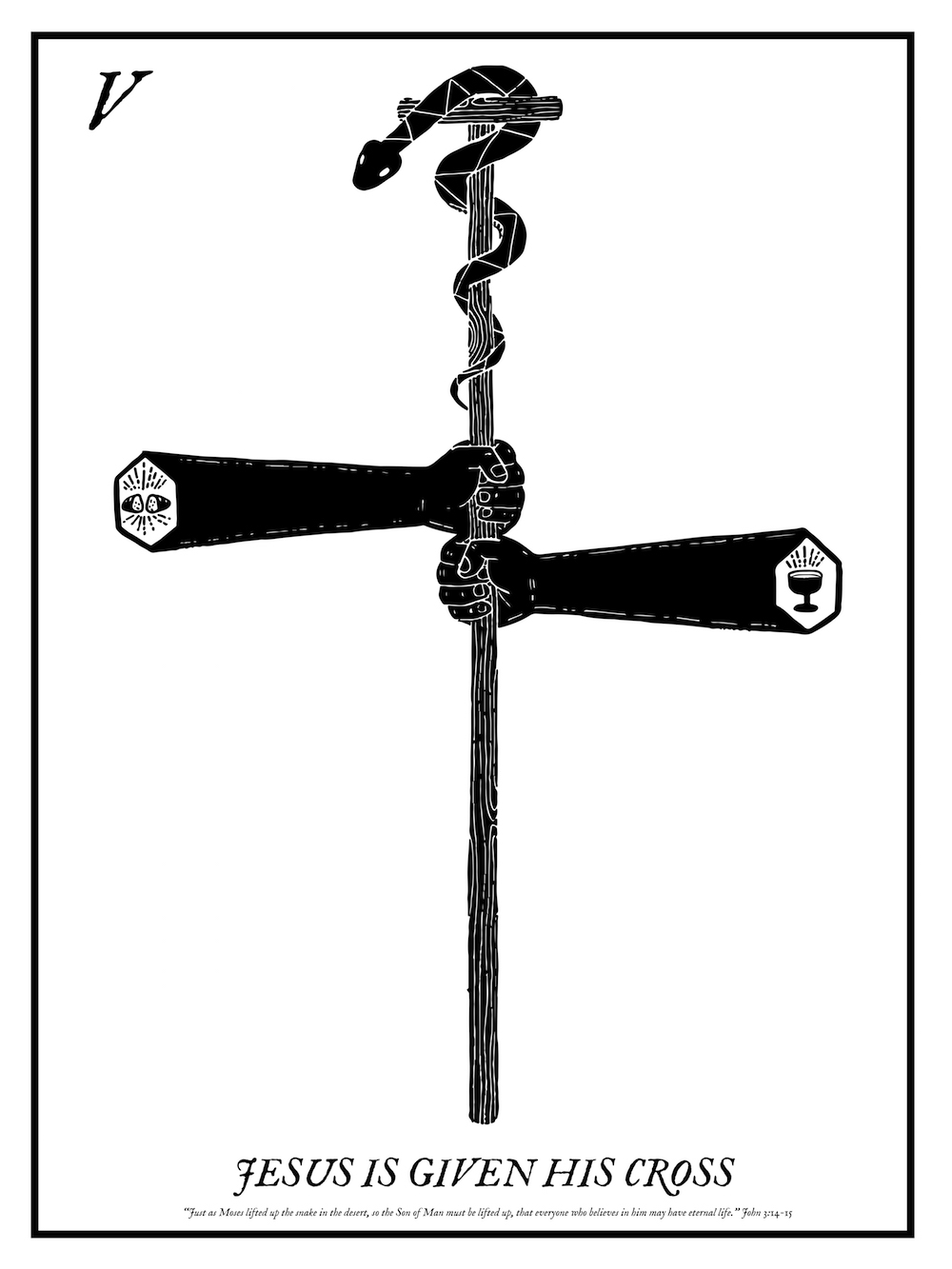
Jesus is Given His Cross
“Just as Moses lifted up the snake in the desert, so the Son of Man must be lifted up, that everyone who believes in Him may have eternal life.” John 3:14-15
Read: John 3:1-21
There was a man named Nicodemus, a Jewish religious leader who was a Pharisee. 2 After dark one evening, he came to speak with Jesus. “Rabbi,” he said, “we all know that God has sent you to teach us. Your miraculous signs are evidence that God is with you.”
3 Jesus replied, “I tell you the truth, unless you are born again,[a] you cannot see the Kingdom of God.”
4 “What do you mean?” exclaimed Nicodemus. “How can an old man go back into his mother’s womb and be born again?”
5 Jesus replied, “I assure you, no one can enter the Kingdom of God without being born of water and the Spirit.[b] 6 Humans can reproduce only human life, but the Holy Spirit gives birth to spiritual life.[c] 7 So don’t be surprised when I say, ‘You[d] must be born again.’ 8 The wind blows wherever it wants. Just as you can hear the wind but can’t tell where it comes from or where it is going, so you can’t explain how people are born of the Spirit.”
9 “How are these things possible?” Nicodemus asked.
10 Jesus replied, “You are a respected Jewish teacher, and yet you don’t understand these things? 11 I assure you, we tell you what we know and have seen, and yet you won’t believe our testimony. 12 But if you don’t believe me when I tell you about earthly things, how can you possibly believe if I tell you about heavenly things? 13 No one has ever gone to heaven and returned. But the Son of Man[e] has come down from heaven. 14 And as Moses lifted up the bronze snake on a pole in the wilderness, so the Son of Man must be lifted up, 15 so that everyone who believes in him will have eternal life.[f]
16 “For this is how God loved the world: He gave[g] his one and only Son, so that everyone who believes in him will not perish but have eternal life. 17 God sent his Son into the world not to judge the world, but to save the world through him.
18 “There is no judgment against anyone who believes in him. But anyone who does not believe in him has already been judged for not believing in God’s one and only Son. 19 And the judgment is based on this fact: God’s light came into the world, but people loved the darkness more than the light, for their actions were evil. 20 All who do evil hate the light and refuse to go near it for fear their sins will be exposed. 21 But those who do what is right come to the light so others can see that they are doing what God wants.[h]”
Reflect: In Numbers 21, there is a story about God’s people being delivered from their oppressors. Not long after God delivered them, the Israelites started complaining about the provisions they had been receiving. The journey they were on felt long and the food was boring and repetitive. So God decided to put them out of their misery by sending venomous snakes. The snakes bit and ultimately killed many of the Israelites. The people knew that the snakes came because they spoke against the very God who worked to save them. So they repented and asked God to deliver them yet again. God agrees to do so by having Moses place a snake at the top of the pole. Anyone who looked up at the snake would live. What a crazy story! The passage above from John is referencing this story in Numbers. Anyone who looked at the serpent lifted up on the pole was granted life. In the same way, anyone who will look to Jesus lifted up on the cross will be granted life. Is Jesus your source of life?

Jesus Falls
“Unless a kernel of wheat falls to the ground and dies it remains only a single seed. But if it dies it produces many seeds.” John 12:24
Read: John 12:23-26
23 Jesus replied, “Now the time has come for the Son of Man[a] to enter into his glory. 24 I tell you the truth, unless a kernel of wheat is planted in the soil and dies, it remains alone. But its death will produce many new kernels—a plentiful harvest of new lives. 25 Those who love their life in this world will lose it. Those who care nothing for their life in this world will keep it for eternity. 26 Anyone who wants to serve me must follow me, because my servants must be where I am. And the Father will honor anyone who serves me.
Reflect: In this passage, Jesus mentions being glorified. He knows that humankind won’t be able to see the crucifixion as glorious. In fact, for them, it was anything but. God turns humiliation into glorification, though. What was initially seen as a hopeless defeat ended up being the most redemptive act in all of history. Seeds are buried into darkness, and then they are broken. It is out of this darkness and brokenness that a spout- new life- breaks through. With time, a plant will form that bears many seeds. Jesus uses this analogy to help explain why he must die, enter darkness, and be broken upon the cross in order to rise again. Those faithful to God will die like seeds. Their deaths aren’t to be mourned because the fruits of their labor for Christ will keep producing for the kingdom for years to come.
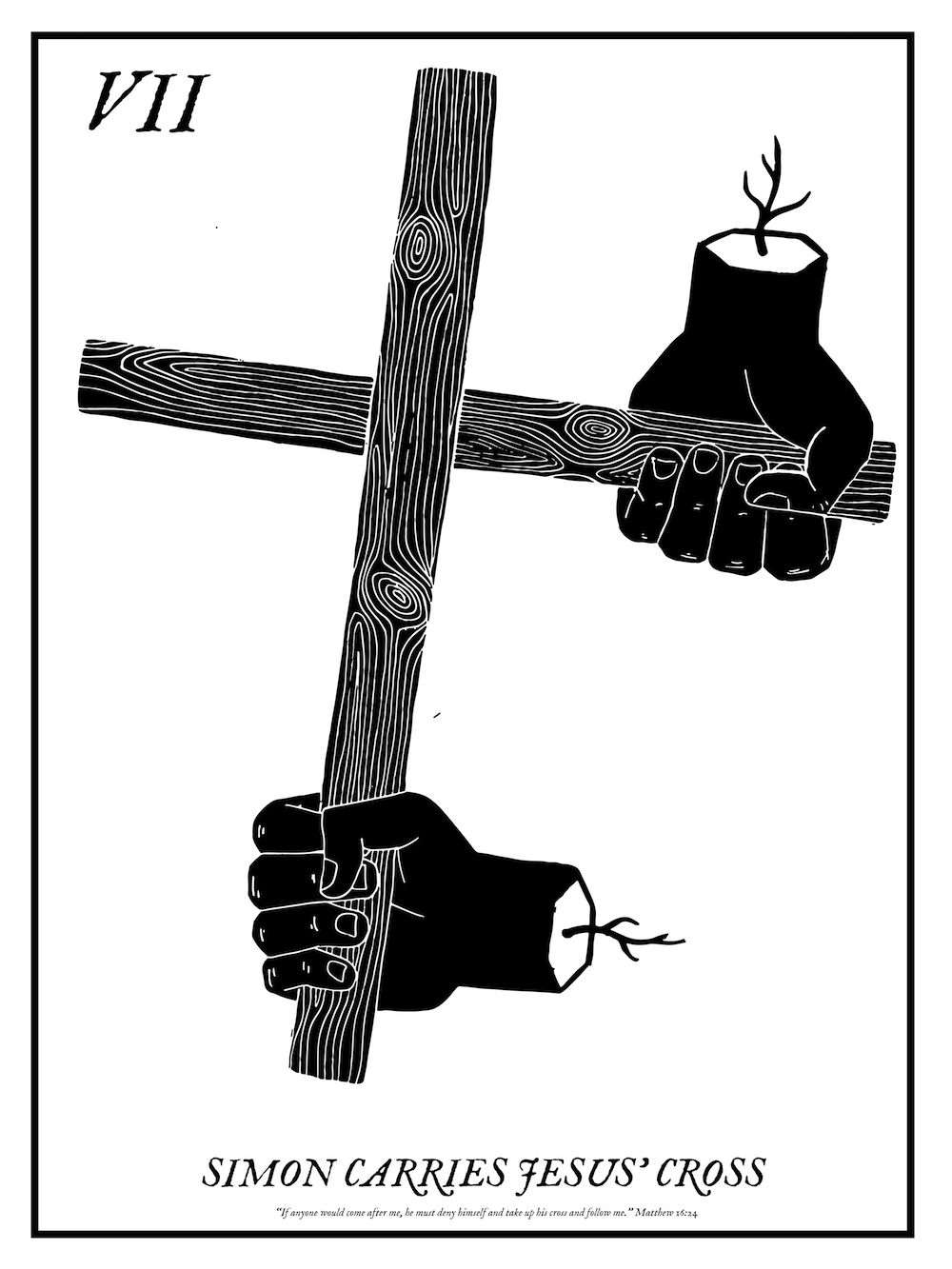
Simon Carries Jesus’ Cross
“If anyone would come after me he must deny himself and take up his cross and follow me.” Matthew 16:24
Read: Matthew 16:24-27
24 Then Jesus said to his disciples, “If any of you wants to be my follower, you must give up your own way, take up your cross, and follow me. 25 If you try to hang on to your life, you will lose it. But if you give up your life for my sake, you will save it. 26 And what do you benefit if you gain the whole world but lose your own soul?[a] Is anything worth more than your soul? 27 For the Son of Man will come with his angels in the glory of his Father and will judge all people according to their deeds.
Reflect: If you want to know what Christian discipleship is, look no further than this passage. The cost of discipleship is everything. If we are unwilling to surrender, we stand to lose everything. Verse 24 is swift, brief, and extreme. A failure of discipleship is a failure of life itself. Discipleship is not something we do- it’s something we become. Even family life is surrendered to the cause of discipleship. Jesus knows what kind of sacrifice this is asking of you. Remember, Jesus is no stranger to sacrifice.
This includes surrendering our ideas of how things ‘should’ happen. For example, Simon carries Jesus’ cross to Gethsemane. Simon is a foreigner. He is most likely not a Jew. Yet, this man who has no connection to Jesus is used to carry out the most redemptive story in all of history. Simon could have been forced by the Romans, but he also could have helped Jesus out of sympathy. We can’t know for sure. What we do know is that God uses a gnostic foreigner to help carry out the redemption of the world. Random, right? Or was it. How could the inclusion of Simon tell us something of who God can and does use to further the kingdom?
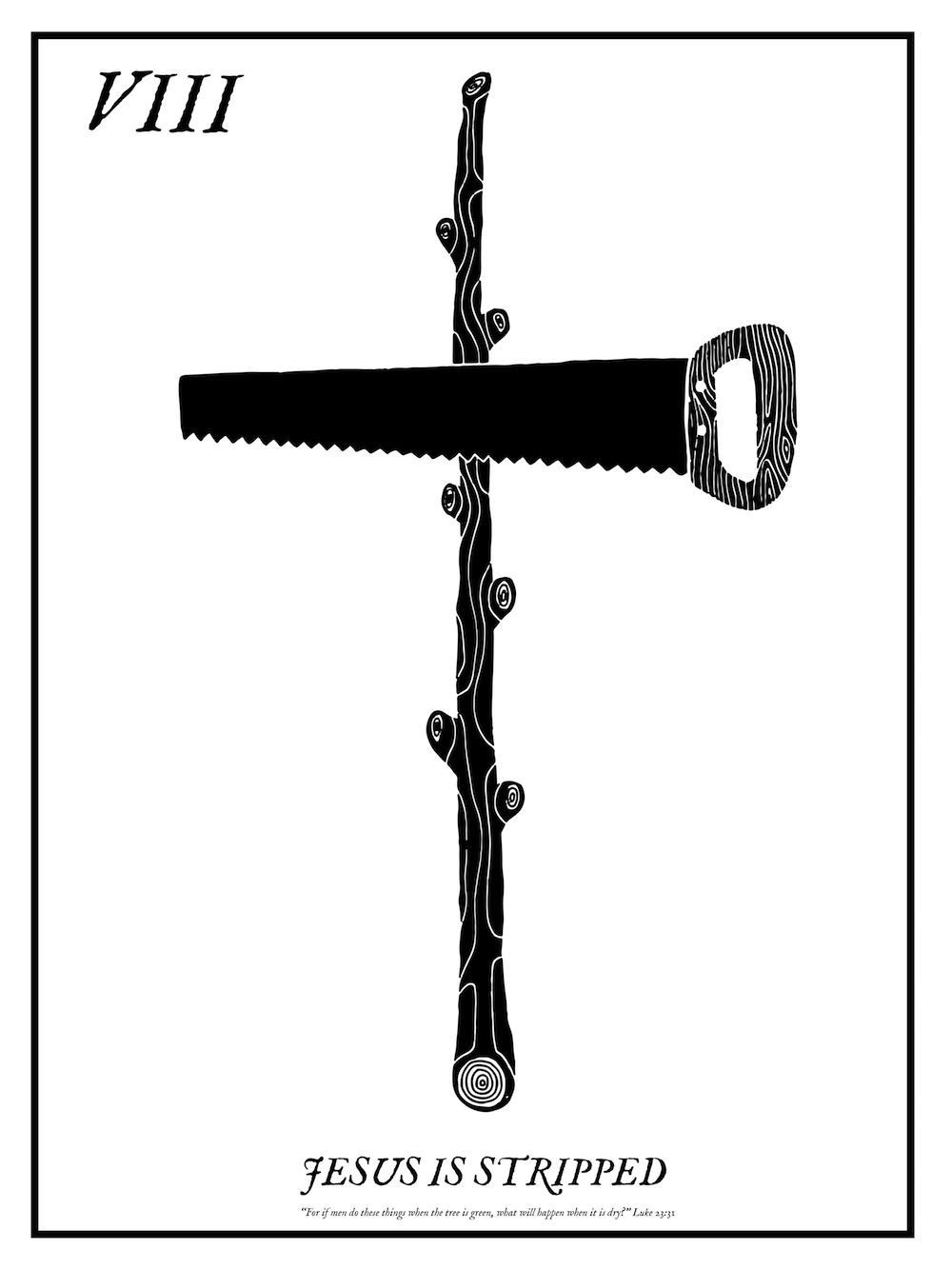
Jesus is Stripped
“For if men do these things when the tree is green, what will happen when it is dry?” Luke 23:31
Read: Luke 23:31-39
31 For if these things are done when the tree is green, what will happen when it is dry?[a]”
32 Two others, both criminals, were led out to be executed with him. 33 When they came to a place called The Skull,[b] they nailed him to the cross. And the criminals were also crucified—one on his right and one on his left.
34 Jesus said, “Father, forgive them, for they don’t know what they are doing.”[c] And the soldiers gambled for his clothes by throwing dice.[d]
35 The crowd watched and the leaders scoffed. “He saved others,” they said, “let him save himself if he is really God’s Messiah, the Chosen One.” 36 The soldiers mocked him, too, by offering him a drink of sour wine. 37 They called out to him, “If you are the King of the Jews, save yourself!” 38 A sign was fastened above him with these words: “This is the King of the Jews.”
39 One of the criminals hanging beside him scoffed, “So you’re the Messiah, are you? Prove it by saving yourself—and us, too, while you’re at it!”
Reflect: To put Luke 23:31 into different words, Jesus is asking “if this is the fate of the innocent, what will happen to the guilty?” In the verses directly preceding this question, Jesus tells the people not to weep for him, but to weep for those who did this to him. Jesus says to mourn for those who outright reject him. In the midst of the greatest act of love that humanity will ever know, Jesus is not honored. He is mocked and sneered at. It’s a horrible reveal of what can come from hearts of doubt. Have you found yourself being quick to condemn someone else? Remember, whatever you do to the least of humanity you do unto God (Matthew 25:45).
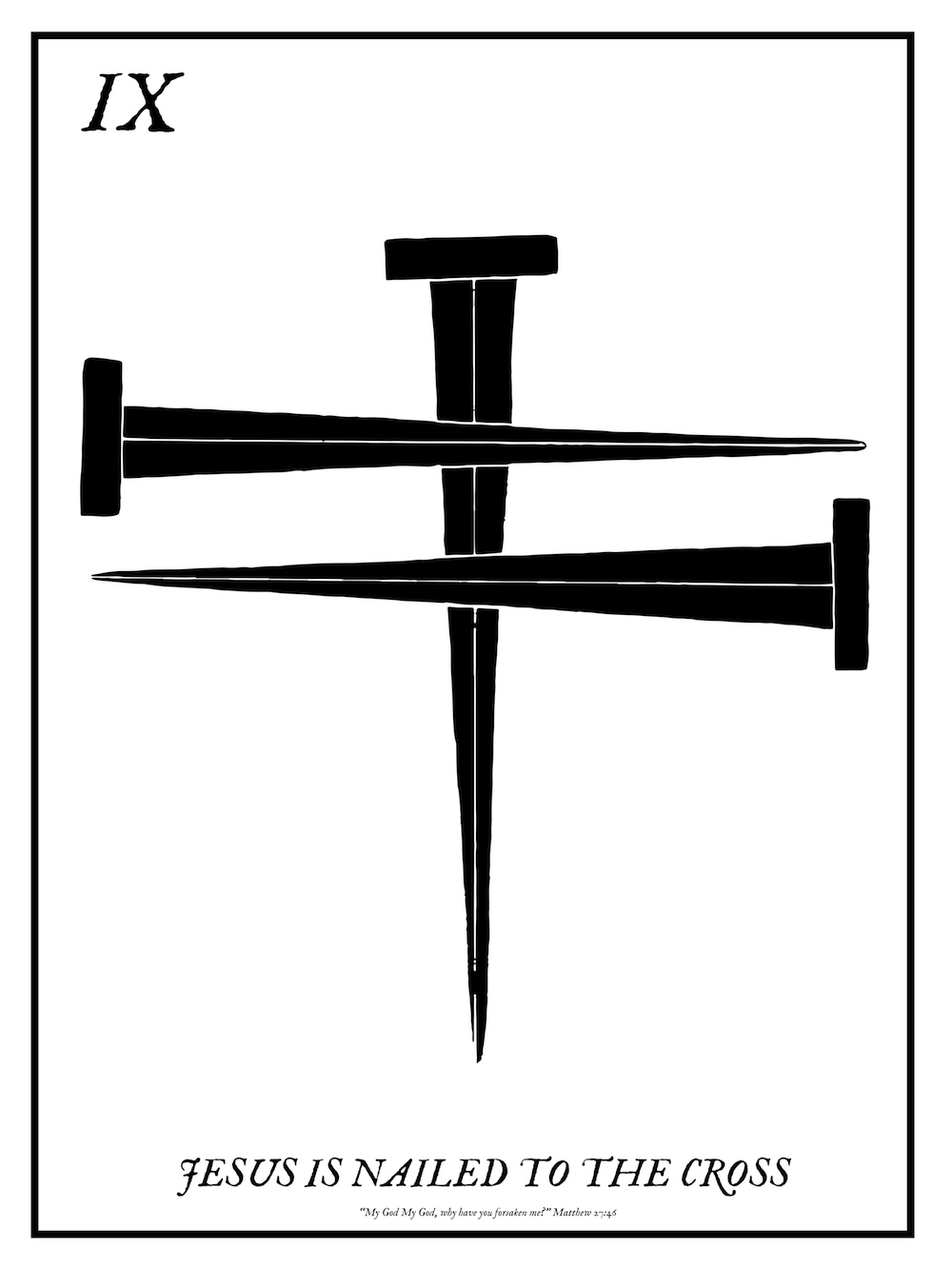
Jesus is Nailed to the Cross
“My god, my god, why have you forsaken me?” Matthew 27:46
Read: Matthew 27:45-46
45 At noon, darkness fell across the whole land until three o’clock. 46 At about three o’clock, Jesus called out with a loud voice, “Eli, Eli,[a] lema sabachthani?” which means “My God, my God, why have you abandoned me?”[b]
Reflect: This verse should make the deepest parts of your soul ache. In this verse we see Jesus, the Savior of the world, express feelings of abandonment for the first time. The incarnate God- Jesus- knew the pains of human existence for the first time at birth. It must have been jarring, cold, and loud. Jesus probably napped, pooped, and laughed throughout his life on earth. It was not until Jesus took upon the sins of the world on the cross that we hear him cry, “Father, how could you leave me all alone here to die?” It’s as if darkness engulfed a part of God’s own being and chaos unleashed. The powers of darkness are powerful. That should not be overlooked. We know that in the end, though, it isn’t powerful enough.
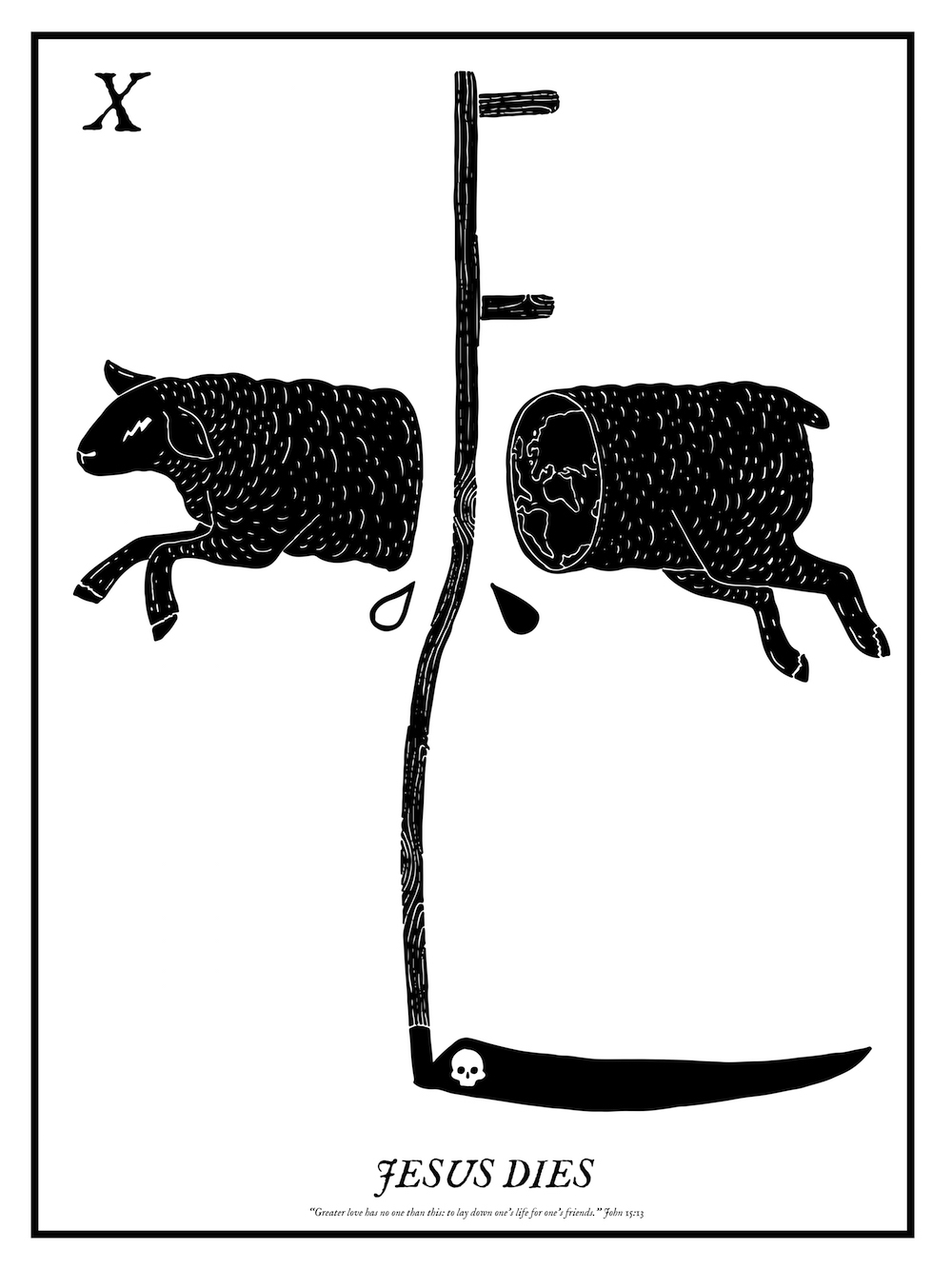
Jesus Dies
“Greater love has no one than this, to lay down one’s life for one’s friends.” John 15:13
Read: John 15:9-17
9 “I have loved you even as the Father has loved me. Remain in my love. 10 When you obey my commandments, you remain in my love, just as I obey my Father’s commandments and remain in his love. 11 I have told you these things so that you will be filled with my joy. Yes, your joy will overflow! 12 This is my commandment: Love each other in the same way I have loved you. 13 There is no greater love than to lay down one’s life for one’s friends. 14 You are my friends if you do what I command. 15 I no longer call you slaves, because a master doesn’t confide in his slaves. Now you are my friends, since I have told you everything the Father told me. 16 You didn’t choose me. I chose you. I appointed you to go and produce lasting fruit, so that the Father will give you whatever you ask for, using my name. 17 This is my command: Love each other.
Reflect: Jesus is the ultimate example of love. While the term ‘friends’ is used in John 15:13, we know Jesus died for far more than that. Jesus died for servants and enemies and foreigners and soldiers. This act of surrender was an extension of this invitation to all: will you be my friend? For us to know the sweet friendship of the Lord, Jesus had to die. Would you consider God a friend?
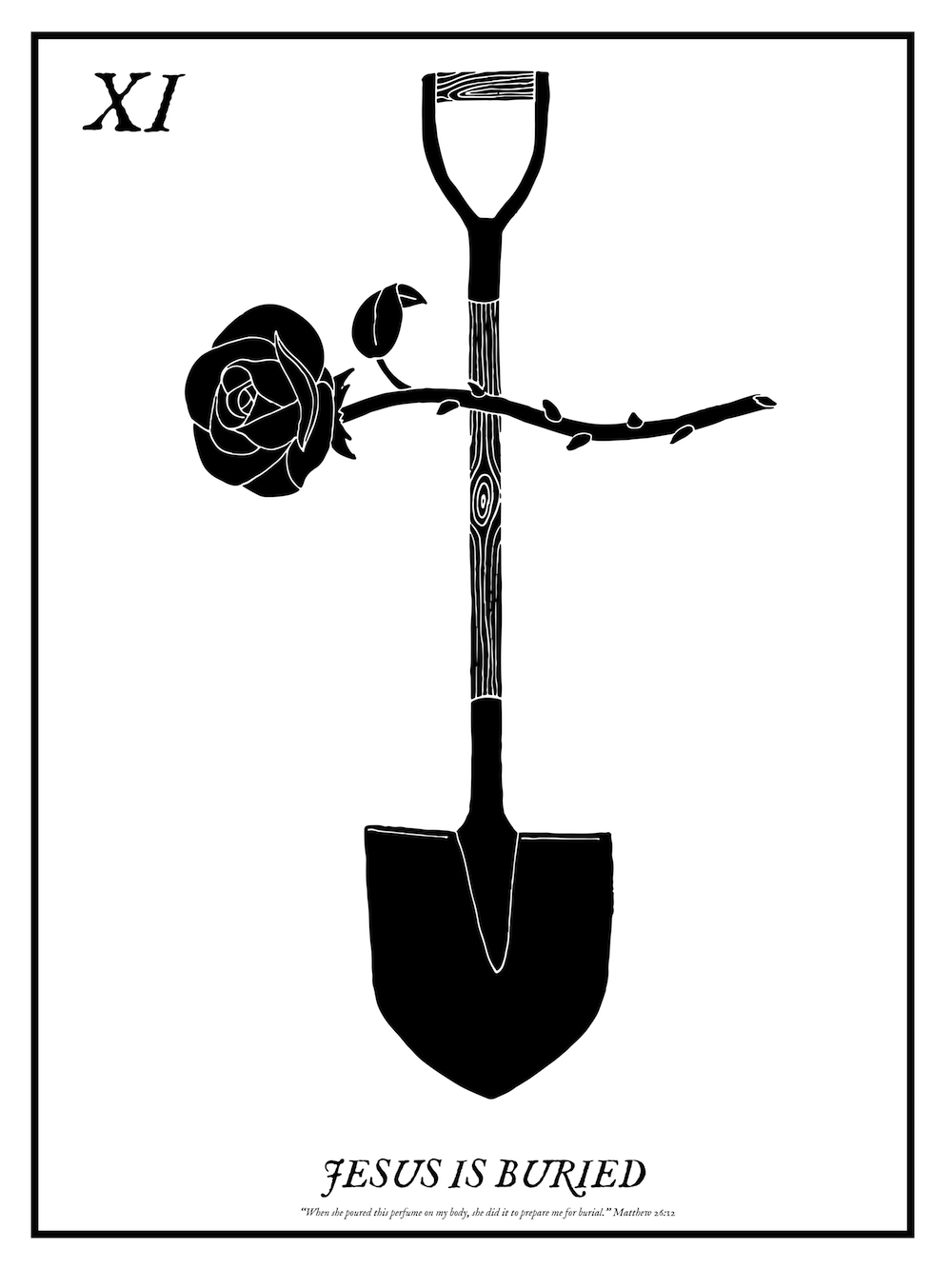
Jesus is Buried
“When she poured this perfume on my body, she did it to prepare me for burial.” Matthew 26:12
Read: Matthew 26:6-13
6 Meanwhile, Jesus was in Bethany at the home of Simon, a man who had previously had leprosy. 7 While he was eating,[a] a woman came in with a beautiful alabaster jar of expensive perfume and poured it over his head.
8 The disciples were indignant when they saw this. “What a waste!” they said. 9 “It could have been sold for a high price and the money given to the poor.”
10 But Jesus, aware of this, replied, “Why criticize this woman for doing such a good thing to me? 11 You will always have the poor among you, but you will not always have me. 12 She has poured this perfume on me to prepare my body for burial. 13 I tell you the truth, wherever the Good News is preached throughout the world, this woman’s deed will be remembered and discussed.”
Reflect: “Why waste?” This was the question the disciples were left pondering after the woman poured costly ointment onto Jesus’ body. They couldn’t see the larger picture. This story encourages us to look at the heart behind the action. We can point fingers all day and claim, “wow, what a waste!” It takes much more effort to think about why people make the choices that they make. Jesus does not condemn the woman for waste, but congratulates her for her generosity, her risk, and her insight. She knew that the Savior of the world was before her. Beyond that, Jesus holds this woman up as an example saying, “be like this woman.” She is never mentioned by name. Instead she will be known throughout history by her devotion to Jesus. What a legacy. When you are buried, will you be remembered by name? By occupation? By the way you loved God and others?
Jesus Rises
“I am the good shepherd. The good shepherd lies his life down for his sheep.” John 10:11
Read: John 10:7-18
7 so he explained it to them: “I tell you the truth, I am the gate for the sheep. 8 All who came before me[a] were thieves and robbers. But the true sheep did not listen to them. 9 Yes, I am the gate. Those who come in through me will be saved.[b] They will come and go freely and will find good pastures. 10 The thief’s purpose is to steal and kill and destroy. My purpose is to give them a rich and satisfying life.
11 “I am the good shepherd. The good shepherd sacrifices his life for the sheep. 12 A hired hand will run when he sees a wolf coming. He will abandon the sheep because they don’t belong to him and he isn’t their shepherd. And so the wolf attacks them and scatters the flock. 13 The hired hand runs away because he’s working only for the money and doesn’t really care about the sheep.
14 “I am the good shepherd; I know my own sheep, and they know me, 15 just as my Father knows me and I know the Father. So I sacrifice my life for the sheep. 16 I have other sheep, too, that are not in this sheepfold. I must bring them also. They will listen to my voice, and there will be one flock with one shepherd.
17 “The Father loves me because I sacrifice my life so I may take it back again. 18 No one can take my life from me. I sacrifice it voluntarily. For I have the authority to lay it down when I want to and also to take it up again. For this is what my Father has commanded.”
Reflect: Jesus protects and promotes life. Life is nothing outside of a relationship with Jesus and that relationship was only made possible through the blood he shed on the cross to atone for our sins. He didn’t come to earth to enforce a bunch of rules that make us miserable. Jesus came so that we ALL could have life- abundant, beautiful life. Doing things that posture us away from God squanders the joyous freedom-filled life intended for us. Jesus the good shepherd sacrifices for his sheep, knows his sheep, and is known by his sheep. Giving his life for our freedom was his greatest sacrifice. Doing so was the greatest act of love and victory. We are loved and death is defeated. Hallelujah! Amen.

